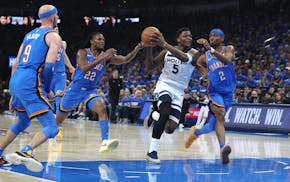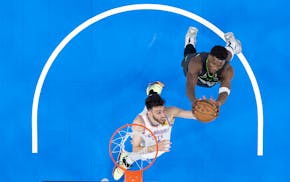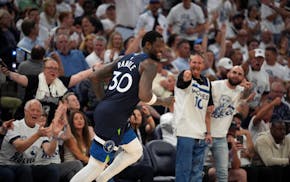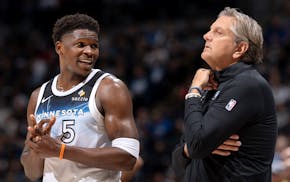Football training camp doesn't allow players much downtime, but if Gophers quarterback Max Brosmer finds five minutes alone away from the grind, he tries to squeeze in a game of chess.
"It's beneficial for my head," he said. "It takes me out of the moment for a second."
The graduate transfer believes a quick game of bullet chess offers more than a way to decompress and get his mind off football. He sees a correlation between chess and playing his position. He estimates playing 10 to 15 games online a day.
"It's a way for me to keep my mental efficiency going," he said. "I think it translates really well to football so that way you can make really quick and decisive decisions."
The Gophers are counting on Brosmer to become a chess master in the football sense to help pull their offense from its one-dimensional rut. To that end, coach P.J. Fleck sounds so bullish about Brosmer's impact that he floated the idea of a 70% completion percentage.
"If you can throw above 70 percent completion percentage," Fleck said, "you're going to win a lot of games. I think when you go back to really explosive offenses we've had here, we pushed that envelope."
That comment raises eyebrows for two reasons.
One: The Gophers completed only 52.6% of their passes last season, which, remarkably, wasn't even the worst in the Big Ten.
Two: No Gophers quarterback has ever finished the season with a 70% completion percentage. Tanner Morgan holds the single-season program record at 66.9% set in 2022.
Brosmer sounded like he accepted that 70% challenge as more of an overall philosophical concept than literal target.
"If you're focused on, 'Oh, I've got to get 70 percent, 70 percent, 70 percent' every single play, you're not really going to get 70 percent," he said. "You're focused too much on being perfect. In the quarterback world, if you're 70 percent or higher, you're elite. For us, that's our goal. We want to be the best and efficient as possible."
Efficient is the optimum word. The Gophers passing game has been the opposite of that in recent seasons. Their inability to establish any consistency or rhythm — for myriad reasons — caused Fleck to lose confidence in his passing operation, which fed into overreliance on the running game.
That's not a pragmatic formula in modern college football, a problem that Fleck sounds intent on correcting. (Yes, we've heard it before.)
Fleck's best offense at Minnesota came in 2019, and that season might provide an indication, if not a blueprint, of how Brosmer might operate the offense as a distributor.
Morgan finished 70th nationally in pass attempts that season but No. 4 in quarterback rating behind Joe Burrow, Jalen Hurts and Justin Fields. Morgan maximized his attempts by making the most of them, the definition of efficiency.
He feasted on slants and quick-hitting passes to future NFL receivers Rashod Bateman and Tyler Johnson. They became so clinical on slants that defenses looked clueless defending it, even though they knew what was coming.
Morgan mixed in deep throws when opportunities were presented, but the passing game established a rhythm because the quarterback completed passes that should be completed at a high percentage. Morgan hit receivers on time and on target, which helped generate explosive plays.
Brosmer's resume at New Hampshire suggests he fits that distributor mold: Spread the ball with high percentage passes and incorporate running backs into the mix. Putting the ball in Darius Taylor's hands as a runner or receiver is never a bad idea.
"What we have the ability to do now is throw the ball to run the ball," Fleck said. "As long as we're consistent at catching the football, we can throw the ball to run."
That's another important part of the calculus: receivers not allowing on-target passes to bounce off their hands. That became a recurring theme when dissecting everything that sabotaged the passing game. All drops are bad. Drops on catchable passes in an offense that throws so infrequently are demoralizing.
Brosmer has impressed coaches and teammates with his maturity, leadership and ability to process what he sees on the field quickly. Completing 70% of his passes sounds like a stretch, but the overarching point should be the main takeaway.
The passing game needs to become a reliable and viable part of the offense — something that can be trusted, not ignored.

Scoggins: Three observations from the Timberwolves' Game 2 loss

Scoggins: Three observations from the Timberwolves' Game 1 loss

Scoggins: Wolves halfway to their goal of 16 postseason wins
Scoggins: Edwards' shoutouts are key to sustained success for Wolves

